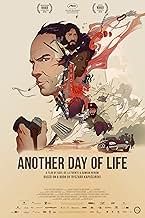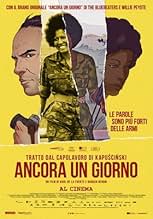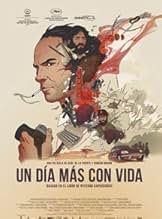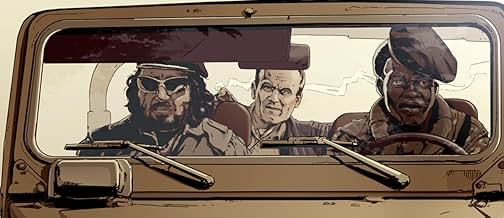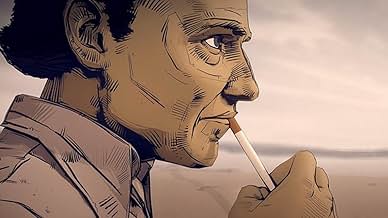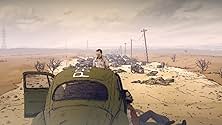El conocido reportero polaco Ryszard Kapuscinski se embarca en un viaje de 3 meses a través de Angola, devastada por la guerra, en el que la línea de frente se mueve día a día como si de un ... Leer todoEl conocido reportero polaco Ryszard Kapuscinski se embarca en un viaje de 3 meses a través de Angola, devastada por la guerra, en el que la línea de frente se mueve día a día como si de un caleidoscopio se tratara.El conocido reportero polaco Ryszard Kapuscinski se embarca en un viaje de 3 meses a través de Angola, devastada por la guerra, en el que la línea de frente se mueve día a día como si de un caleidoscopio se tratara.
- Premios
- 14 premios ganados y 9 nominaciones en total
- Self
- (as Luis Alberto)
- Self
- (material de archivo)
- (as Carlota)
- Self
- (as Farrusco)
- Queiroz
- (as Vergil Smith)
- …
- Queiroz
- (voz)
- Carlota
- (voz)
- Friedkin
- (voz)
- …
Argumento
¿Sabías que…?
- TriviaIt took 10 years to make the movie.
- ErroresIn the animated sequences of the South African army invading southern Angola, they are shown having American helicopters such as the Huey and Chinook.
In reality they had helicopters of French design, such as the Aloutte and Puma.
- Citas
Ryszard Kapuscinski: It's a special kind of oppressiveness we feel now. Because this is a lesson drawn from history. That blood will flow.
- ConexionesFeatured in Premios Goya 33 edición (2019)
And, while it's been a really long time since I've seen that film, the ghost it left behind inside of me, with its visuals and story ruminating within my mind consciously and my spirit subconsciously, there's a lot of shared DNA here. Tragedy. The cruel inescapability of war and conflict in the human experience and the human emotional response to those forces. The surreal, dreamlike imagery. But the most crucial thing might be where they depart.
See, Waltz was a very tight, coherent story. It flowed smoothly and was paced well and it was centered around a dark truth from the past and how crimes against humanity never merely pass into nothingness, they continue to echo both within those misfortunate enough to have survived or taken part in them, but also in a tragically karmic way, of continuing the cycle of violence and hatred in a perpetual dance of misery between the victim and the oppressor as the roles change hands. In that film it is the recognition of this fact amidst a recognition of shared humanity that challenges the viewer to slowly unravel it and eventually come face to face with the Other as Self and see the Self as Other.
I only wish Another Day of Life was so well put together and envisioned. It's full of brave, bold choices, not the least of which is blending documentary content (interviews, real-world photos and shots) with the animation throughout the film. This is something I've never seen done in this way, and it really did strike me as creatively brilliant. But it also held this film back from being its best self. The filmmakers seem to be trying to convey something here, as we the audience get routinely pulled out of the narrative, often with little warning or with abrupt transitions, to see one of our characters in real life at present day, giving their own narrative account of the events. This gives the film a kind of authenticity few others ever carry and give it something perhaps even rarer: a real sense of PERSPECTIVE.
But with perspective, comes bias. And, for me, not being at all well-versed in the subject matter, I found myself starting to feel that bias as unsettling. Losing objectivity is one thing, but it's another to start feeling one has to question accuracy and truth. What's the other side of the story, I wondered. Surely, the real world rarely gives us examples of such a simplistic narrative as "MPLA as goodguys, FLNA/UNITA as badguys". Surely all parties had their own interests, motivations, and agency beyond simply being manipulated by the Western or Soviet Blocs... and yet, we get none of that context here. We simply see the struggle as it was experienced by the characters. I think a more self-aware film might have attempted to predict and preempt this viewer reaction, but perhaps it would not be faithful to the source material then-I don't know, as I haven't read the book upon which this is based.
In any case, beyond the questions of rationalist viewers' minds who might start having their "propaganda/politics alarms" going off, there's a far more practical problem that this format introduces: that it is ver jarring to the audience to be pulled in and out of a narrative. This might have been eased if the editing were done to make the transitions smoother, but it almost felt like the intention was the opposite: to intentionally jolt us, as if to say "don't get caught up in hearing a good story... do not forget that this is not just a story, it is of real people and their lives". And to that, I must simply bow my head, because it certainly had that effect on me. It took me out of the excitement, the drama, all of it, and brought me back, face-to-face, again and again with the sobering reminder that this was real. For, there were the real people... those still alive to speak to their experience. That is something that all too often gets lost in this kind of film, as we watch events unfold in detachment, even if we know they are rooted in reality. To suddenly hear the words of that same character speaking to the camera and explaining it... well that is another thing. I applaud the bravery to go this route.
Still, not everyone is going to enjoy the experience, for it is not made to be enjoyed, and perhaps maybe that is the way such films should be made. It is not for us to feel good, have a happy ending, or retain our sense of safety and detachment. This film wants us to recognize there is something deep here about human nature and perhaps just about nature itself and how the world works, that when the chaos comes, we cannot always escape it. We can choose whether or not to participate in it... and what part to play or which side to be on, and then make the choices we can where we can, and if we are very lucky they might be ones that have a chance to shift the course of events. But nevertheless, we mostly just survive it. Or not. And the film wants us to know that these times are not things that only exist "over there", or even just "out there", they are everywhere and they will always come again, and yes, too, they even extend inside of us, as battles that rage within our hearts and minds and our souls as we are forced to choose and to act within such events. I was reminded of the saying, though I cannot recall its source or veracity: "people think they make history, but it is often the other way around".
So, maybe the disjointed feeling of the edits and style are there for a reason, or maybe I'm just making up reasons that act as excuses to an unpolished presentation... I don't know. But the situation is not helped by the constant injection of surrealism and dream sequences that border on magical realism at times. This too might have artistic merit and may well represent a unique voice. And if you are open to that kind of thing you will enjoy it. But, objectively, it does not help the film move along and work together AS A FILM. And so, if you are going into this expecting just a good, straight-forward animated story, you might be put off but something that at times feels like you went from watching the Killing Fields or Apocalypse Now to the Science of Sleep. If symbolic representations of the deconstruction of a character and their world in the midst of key scenes make you roll your eyes, you may want to pass on this one. If that sounds intriguing and worth a look, put this higher up your list. If you're open to it, but skeptical, just be aware going in so you don't try to put this on for a group that isn't going to appreciate it.
So, if you are up for it, this is a thought-provoking film and might be the beginning of a good deal more reading for you as you attempt to sift through sources and authorities and try to judge how biases or balanced the accounts might be. You are in for something that will impact you and make you think, and there are some truly gut wrenching and tear-worthy moments, as well as some heart-warming ones. You'll be left conflicted, but it will feel appropriate and earned. Unless you turned the film off after the 7th time animation abruptly gave way to a real-life interview, or our main character suddenly flying through space yet again left you wondering what the hell was actually going on. Any true voice is neither unbiased, nor balanced.... But has something perhaps even more worth your listening if you give it the chance.
- leoocampo
- 23 mar 2022
- Enlace permanente
Selecciones populares
- How long is Another Day of Life?Con tecnología de Alexa
Detalles
- Fecha de lanzamiento
- Países de origen
- Sitios oficiales
- Idiomas
- También se conoce como
- Another Day of Life
- Locaciones de filmación
- Cuba(location)
- Productoras
- Ver más créditos de la compañía en IMDbPro
Taquilla
- Presupuesto
- EUR 7,700,000 (estimado)
- Total en EE. UU. y Canadá
- USD 3,190
- Fin de semana de estreno en EE. UU. y Canadá
- USD 1,691
- 15 sep 2019
- Total a nivel mundial
- USD 134,801
- Tiempo de ejecución1 hora 25 minutos
- Color
Contribuir a esta página



